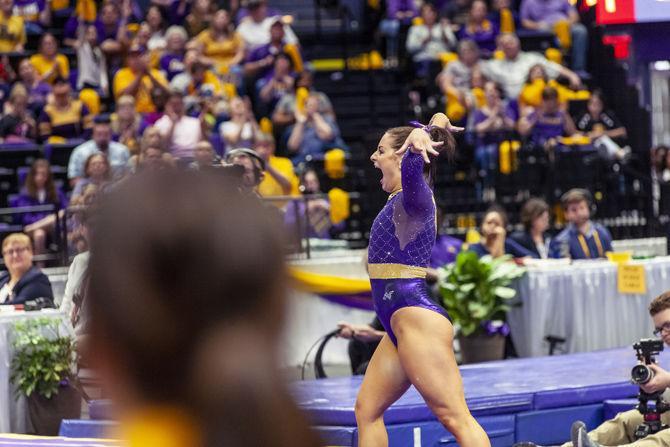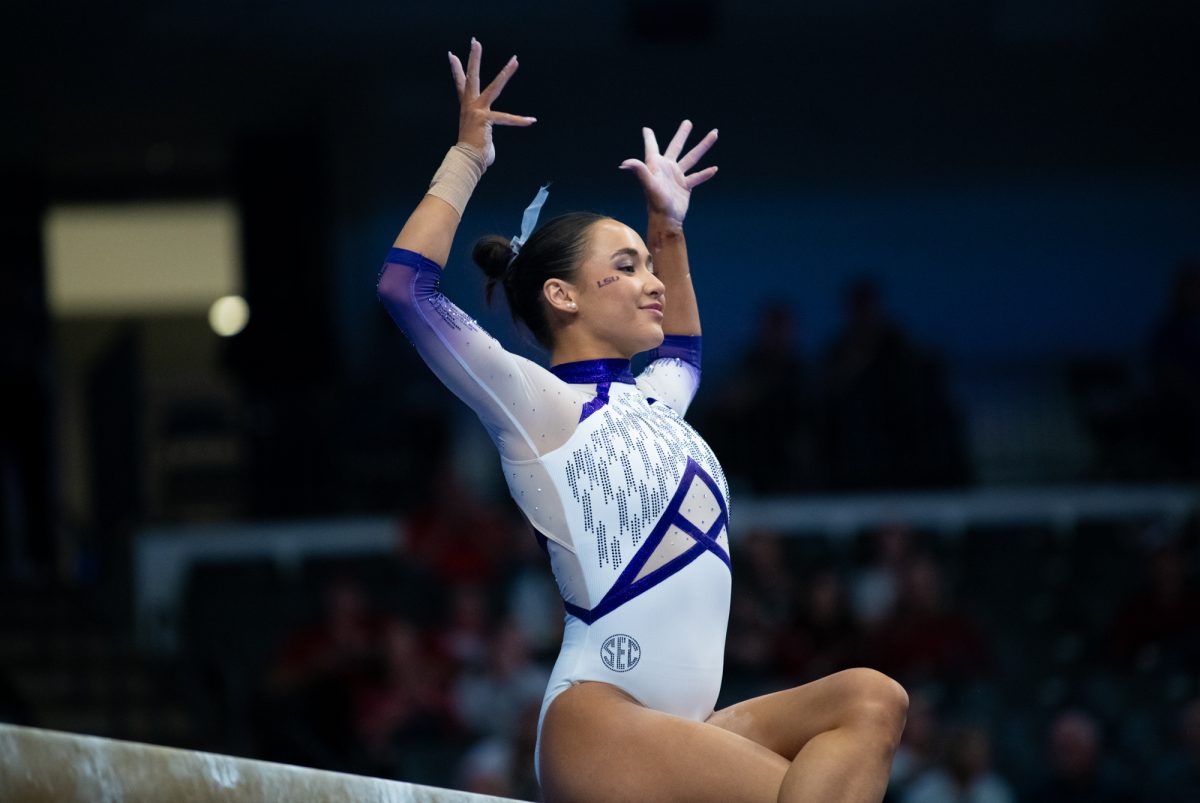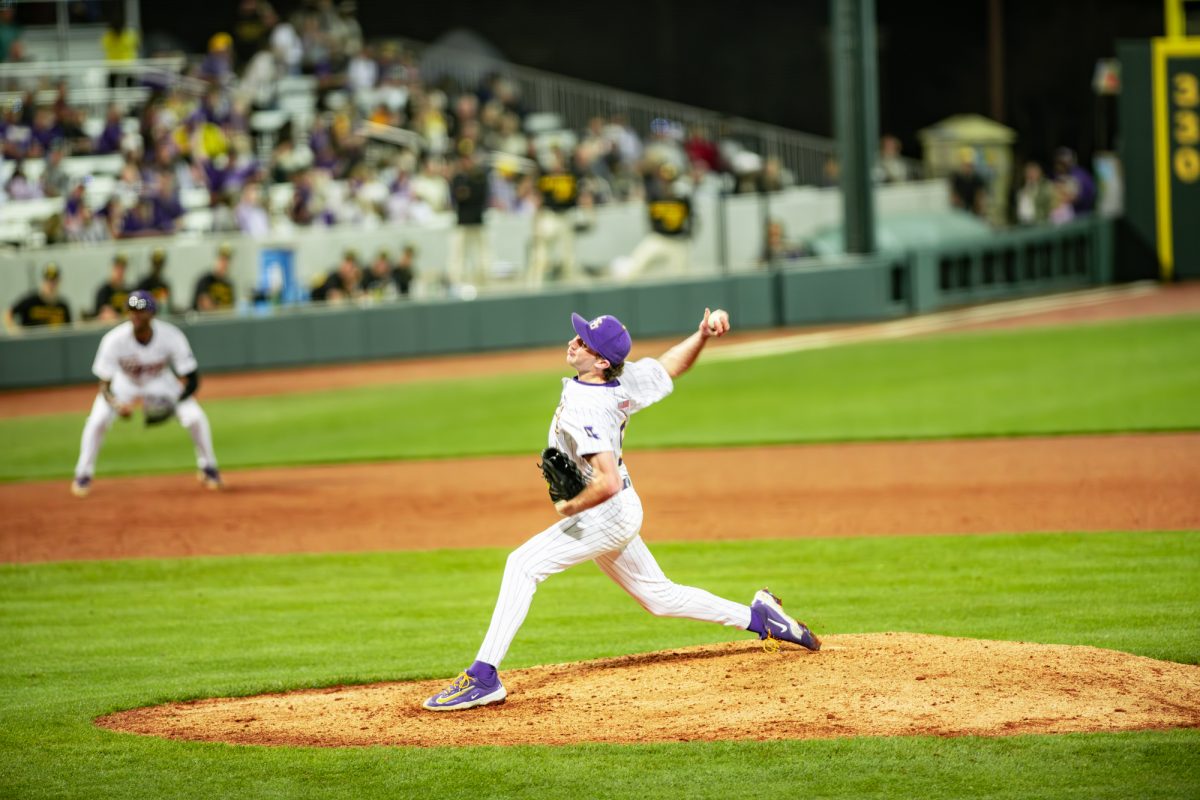Beauty is in the eye of the beholder and apparently so are gymnastics routines.
Gymnastics is arguably the most subjective sport in the NCAA, but in recent years the judging of the sport has come under fire both by fans on social media and by coaches and gymnasts across the country.
“It’s a subjective sport,” said LSU senior Sarah Finnegan. “There’s nothing that we can really do about it. We always say that what we need to do is be undeniable. When you’re undeniable, then they can’t take anything away from you. That’s the mindset that we need to be in going into each competition. If we lay it all out on the floor, they’re not going to be able to take anything away from us.”
Inconsistencies across different conferences and favoring different teams has been the main issues regarding NCAA judging. Going into Week 9 of the 2019 season, no Southeastern Conference gymnast has received a perfect 10 from a judging crew. Consequently, the Big 12 has four perfect 10s, with Oklahoma having three of them, and UCLA of the PAC-12 has 10.
Multiple times this season, various LSU gymnasts have been given scores from two different judges that have more than .5 point differences. Sometimes those differences have cost LSU a perfect 10.
“I just think there’s a world of difference between a 9.80 and a 9.95,” LSU coach D-D Breaux said. “That’s a world of difference between those kinds of performances, and I think the judges should be a little bit better prepared to give great scores to great performances. If somebody has a mistake, that’s not a 10.0 routine. But if somebody has a flawless routine, they could go 9.95 or 10. They just have to be able to discern the difference in those quality performances.”
More recently, in LSU’s 197.125-196.375 win at Arkansas on Feb. 22, senior all-arounder Sarah Finnegan received a 9.95 on floor, while fellow senior McKenna Kelley scored a 9.75, well below her season average of 9.856.
“I thought the scoring was a little biased,” Kelley said. “That’s never fun, especially when you’re doing your job.”
“Home scoring” has been an internal issue within the sport of gymnastics for years, but this is not the first time Kelley has experienced a scoring discrepancy in her floor routine.
In a home meet against Florida on Jan. 18, Kelley needed a 9.925 to tie and a 9.95 to win the meet. Kelley, who has a career average of 9.869 and career high of 9.975 on the floor, was given a 9.875 for a routine that had little difference from her 9.90 in the season opener against Cal.
“That’s a part of our sport,” Kelley said. “Unfortunately, unlike basketball or even football, we don’t play by a clock. We don’t play by time, we play by what judges think and that’s just how our sport works.
“It’s discouraging knowing that regardless of the work you put in, judges kind of have this biased opinion of what they want to give you because of the name on your leotard,” Kelley said. “It’s frustrating, but it’s something that we can’t control. Moving forward, we just have to focus on our performance.”
Finnegan cites the two judges being on different ends of the floor and having different angles on the routines as reasons for large variations in scoring. In the postseason, there will be six judges across the floor, in hopes to make the scoring more accurate.
“It’s always about perspective,” Finnegan said. “It’s always a different point of view. That’s why in postseason we’re going to have a panel of six judges and that’s going to change things a bit. Different angles — it might look like a good handstand, it might not from where you’re sitting at. That’s why they have six judges, to make things a little more accurate.”
Breaux said it takes a great deal of mental toughness for gymnasts to be able to set aside their thoughts and anxieties on judging and compete to the best of their ability no matter what.
“I think you have to be mentally tough to be able to put it aside,” Breaux said. “The main message is to control the things you can control. If your athletes are out there doing their best, giving you 100 percent, and there’s a flaw here or there — move on. It’s not world hunger. Go on and move forward with it. I think our team is doing a good job of doing that. Removing the clutter and focusing on those things they can control. They really have done a great job these last four competitions of defining who they are and how they want to compete and where they want to go.”
‘Be undeniable’: LSU gymnastics looking past inconsistent judging in 2019 season
March 1, 2019
LSU junior all-around Mckenna Kelley performs a floor routine during the Tigers’ 197.650-195.475 victory over Mizzou on Sunday, Feb. 17, 2019.
More to Discover









